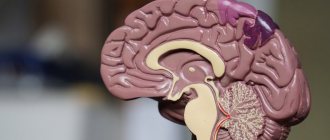Neurosis - what is it?
Neurosis is a collective term that refers to certain types of neurotic disorders. It can develop in both women and men. At risk are people who are in a certain phase of physiological changes: aging of the body or puberty. However, neurosis can occur at absolutely any age. In children, it usually goes away on its own, without treatment, and does not lead to any mental disorders. In adulthood, neurosis can greatly affect health - both physical and psychological. Often, neurotic disorders in adults cause pathologies of internal organs.
Negative stressful situations and acute psychological trauma can cause various painful manifestations in a person. The catalyst for neurosis can be an unresolved internal conflict or strong pressure from external factors that are uncomfortable for the patient. At the same time, not only severe injuries can provoke a neurotic disorder. Sometimes it becomes a consequence of mental fatigue or constant worry.
Neurotic disorders can manifest themselves in a variety of ways. Their most common signs are general malaise, obsessive thoughts, and fears. Neurosis often contributes to a decrease in mental activity and physical endurance. A person cannot fully perform his work, the quality of his work deteriorates. The patient becomes irritable, aggressive, and conflictual.
If this disorder is not treated promptly, severe mental illness may occur.
How is stress related to vision impairment?
Muscles that become tense due to stress are responsible for good vision and eye health. Long-term exposure to overvoltage leads to changes in tissues and various deviations from the norm, such as myopia and other eye diseases.
By following a sleep and rest schedule and eliminating stressful situations, vision is restored. Special gymnastics has a positive effect on eye health. Do not forget about timely consultation with a doctor, strict adherence to recommendations and hygiene. In some cases, spontaneous restoration of vision is observed, but not always.
Causes of neurosis
There are several theories, each of which suggests considering certain factors that provoke neurotic disorders. So, from the physiological point of view, neurosis is a pathology of the body, the cause of which is a malfunction in the nervous system. Excessive mental activity, accompanied by a large number of nervous processes, can contribute to the destabilization of the psychological state.
There is another theory, according to which the cause of neurosis is a combination of an irritant and personality characteristics. For example, there is a stressful situation. People may perceive it differently. Some may treat it indifferently or with great patience, others are not always able to adequately respond to various stimuli.
General health is also important. People who do not take care of their health, smoke, eat poorly, abuse alcohol, do not have a clear regime and daily routine, often get sick, are constantly overworked physically and mentally, and are more susceptible to neuroses. In the event of a stressful situation, they are especially vulnerable. At the same time, not only negative factors can provoke a disorder. Even positive emotions can lead to the development of neurosis. The sharp and constant alternation of positive and negative factors has an even worse effect on the psyche. Thus, in childhood, a neurotic disorder can be the result of a “carrot and stick” type of upbringing.
There is also a psychoanalytic theory. Neurosis, according to its postulates, is the result of an internal conflict that arose due to the dissatisfaction of a basic need.
Moreover, the foundations of conflict can be laid at any age. Subsequently, they manifest themselves in the form of an unstable psychological state.
In general, the causes of neurosis in certain cases are the following factors:
- isolation of a person from society;
- conflict between instinctual drives and moral standards;
- strong pressure and control from others;
- a person's strong need for protection or recognition;
- a thirst for power, glory that cannot be satisfied;
- striving for ideality, perfectionism;
- inability to rest, uncontrolled workaholism;
- lack of life experience and skills to adequately perceive stressful situations.
These are psychological reasons. Physiological diseases include diseases of infectious or inflammatory etiology, addictions, including alcoholism and smoking. These factors reduce immunity, and therefore the body’s resistance to the external environment. How does a neurotic disorder manifest itself? Is it possible for vision to deteriorate with neurosis?
Most common causes of vision loss
Each of us should imagine the degree of danger to the eyes, which sometimes lies in even the most harmless disease or injury. Therefore, the following is a list of the most common reasons that contribute to the loss of visual acuity:
- Conjunctivitis. This is an inflammation of the mucous membrane of the organ of vision. The disease can occur due to infection or exposure to allergens. In the first case, to eliminate it, therapy with antibacterial or antiviral agents is necessary (depending on the type of pathogen); in the second, the use of antihistamines that can relieve allergy symptoms. The disease is very often accompanied by lacrimation and mucus secretion. Loss of visual acuity is caused precisely by excess secretions.
- Injuries. Any injury to the eye can cause a sudden deterioration in vision. Therefore, even if there are minor manifestations, you should consult a specialist after it.
- Postoperative complications.
- Common infectious diseases.
- Excessive mental stress, overwork, stress.
Any of the above reasons may lead to a decrease in visual acuity. However, with adequate timely treatment, vision is restored quite quickly and completely. But there are also more serious diseases, which can result in sudden loss of vision, sometimes in one eye, sometimes in both at once. At the same time, recovery, as a rule, continues for a long time and is not always complete.
Symptoms of neurosis
There are two large groups of signs of neurosis: psychological and physical. The first include:
- emotional instability, frequent and causeless mood swings;
- lack of initiative, indecision;
- inadequate self-esteem: overestimation or underestimation of one’s own abilities;
- obsessive thoughts, uncontrollable fears;
- irritability, aggressiveness;
- constant feeling of anxiety, restlessness;
- a cynical attitude towards others, a desire to criticize everyone and for any reason;
- inconsistency of desires and needs;
- tearfulness, vulnerability, excessive impressionability, touchiness, suspiciousness.
A person in a state of neurosis concentrates heavily on traumatic events. In other words, this or that situation does not let the patient go; he constantly thinks about it, considers himself guilty, even if there is no reason for this. It’s almost impossible to focus on work or positive life moments. In this state, it is impossible to perform the amount of work that is normal for a healthy person. Labor productivity is falling. Because of this, a conflict situation at work may arise. This will worsen your mental state.
The most common symptom of neurosis is insomnia. It becomes increasingly difficult for a person to fall asleep at the usual time. If he does fall asleep, he has nightmares and wakes up in a cold sweat. In the morning you feel very tired, and drowsiness persists throughout the day.
Sometimes neurosis is accompanied by increased sensitivity to sounds. Loud voices and music irritate the patient. Photophobia and meteosensitivity develop. These factors are associated with the physical manifestations of neurosis. Among them:
- headache that hardly goes away, dizziness;
- discomfort in the heart area;
- digestive problems;
- increased blood pressure;
- weakness and trembling of hands;
- decreased appetite;
- excessive sweating;
- frequent need to urinate;
- changes in the menstrual cycle;
- decreased sex drive;
- the appearance of “floaters” before the eyes, blurring of vision, and a decrease in its acuity.
These symptoms are quite common and characteristic of many diseases. It’s difficult to call them specific. Consequently, when they appear, the doctor does not always look for reasons in the psychological state of the patient. Because of this, neuroses are always very long lasting.
Visual impairment due to VSD
There are several causes of visual impairment in VSD:
- disturbance of blood circulation in the blood vessels of the head. The small vessels of the eye become thinner, the blood circulation of the eye is disrupted, the image is distorted, and visual acuity decreases. Lack of blood circulation in the vessels of the brain and eyes causes image distortion;
- panic attacks, increased anxiety are accompanied by a feeling of constant fear, have a negative impact on thinking, mood, functioning of the nervous system and all organs and systems. This leads to disruption of the visual system;
- a person living in stress perceives the world in “black colors”, he loses interest in life, stops recording joyful and interesting events - this manifests itself in the form of detachment from everyone, the eyes turn red, hurt, the body is exhausted by stress, immunity drops, the patient sees the surrounding reality in dim, unclear images. Stress leads to loss of vision, exacerbation of chronic diseases;
- stress or neurosis often leads to loss of appetite, the patient is indifferent to the quality of his diet, and the daily diet lacks nutrients and vitamins. An unbalanced diet causes a lack of nutrients in the brain, brain tissue and blood vessels begin to suffer, the functioning of brain structures is disrupted, vision decreases, and memory deteriorates.
Clinical manifestations of the visual system in vegetative-vascular dystonia:
- flickering spots in the eyes are observed when overtired, changing position;
- a flash of light that may be accompanied by loss of balance;
- pain in the eyes occurs in bright light, when touched, blinking, the pain can become constant, aching, one-sided or two-sided;
- there is double vision, the image is distorted, the clarity of the image disappears;
- when looking at an object, the surrounding background loses clarity and becomes cloudy;
- it becomes dark in the eyes, for a certain time the patient sees only a dark background without the outlines of objects.
Deterioration of vision due to neurosis
Neurosis and vision: can they be connected? As mentioned earlier, neurotic disorder occurs for various reasons, including as a result of infectious diseases. Moreover, the consequences of these disorders are also varied. Deterioration of vision due to neurosis is a fairly common picture observed by doctors.
Psychogenic manifestations of an unstable mental state include: narrowing of visual fields and a decrease in its acuity. Patients come to the ophthalmologist with complaints that they see poorly or see almost nothing. In this case, the patient is well oriented in space, does not bump into objects, and can even drive a car. Upon examination, it turns out that there are no visible reasons for the decrease in visual functions. This is due to the fact that the main factor leading to vision deterioration is a person’s reluctance to “see the problem.”
Narrowing of the visual fields is characteristic of hysterical neurosis. Usually it is also accompanied by increased photosensitivity and various signs of asthenopia - rapid eye fatigue.
The behavior of patients also changes. It can be partly called strange. On the one hand, a person complains of decreased visual function, and sometimes partial or complete blindness. On the other hand, such a condition does not cause him great anxiety, as it does in people who suddenly become blind. In other words, vision loss is not so painful if there are no pathological reasons behind it. They are not detected during examination. When the ophthalmologist has ruled out all hypothetical ailments that could explain the deterioration of vision, we are talking about psychological factors.
When a person is very frightened, he develops anxiety, a desire to hide, he instinctively closes his eyes so as not to physically see the problem. This is how a person protects himself with the help of various functions of his body. Psychological protection will manifest itself in the appearance of a veil before the eyes, narrowing of the visual fields and other ophthalmological symptoms.
Tricyclic antidepressants
Most ocular side effects of TCAs occur during the induction phase of treatment [26]. Frequent complications associated with the anticholinergic effect of TCAs are mydriasis, cycloplegia [2], and decreased tear production [1].
Over time, these complications may resolve on their own. Otherwise, you can prescribe a 0.5% solution of pilocarpine. Wearing tinted glasses or photochromic lenses will also help alleviate the patient's condition [25].
TCAs can lead to an attack of PAH in predisposed people [8], which is also associated with the anticholinergic effects of these drugs and subsequent mydriasis [24] and cycloplegia [25]. Therefore, TCAs should be prescribed with caution to patients with risk factors for PAOG: Mongoloid race, narrow anterior chamber angle, shallow anterior chamber depth, nanophthalmos, previous angle closure of the other eye, old age, family history, female gender [8]. RF Lowe reports that in a study of 106 patients with an attack of acute PAAG, only 4 of them took amitriptyline, the TCA with the greatest anticholinergic activity, and they had not previously been diagnosed with glaucoma [26].









